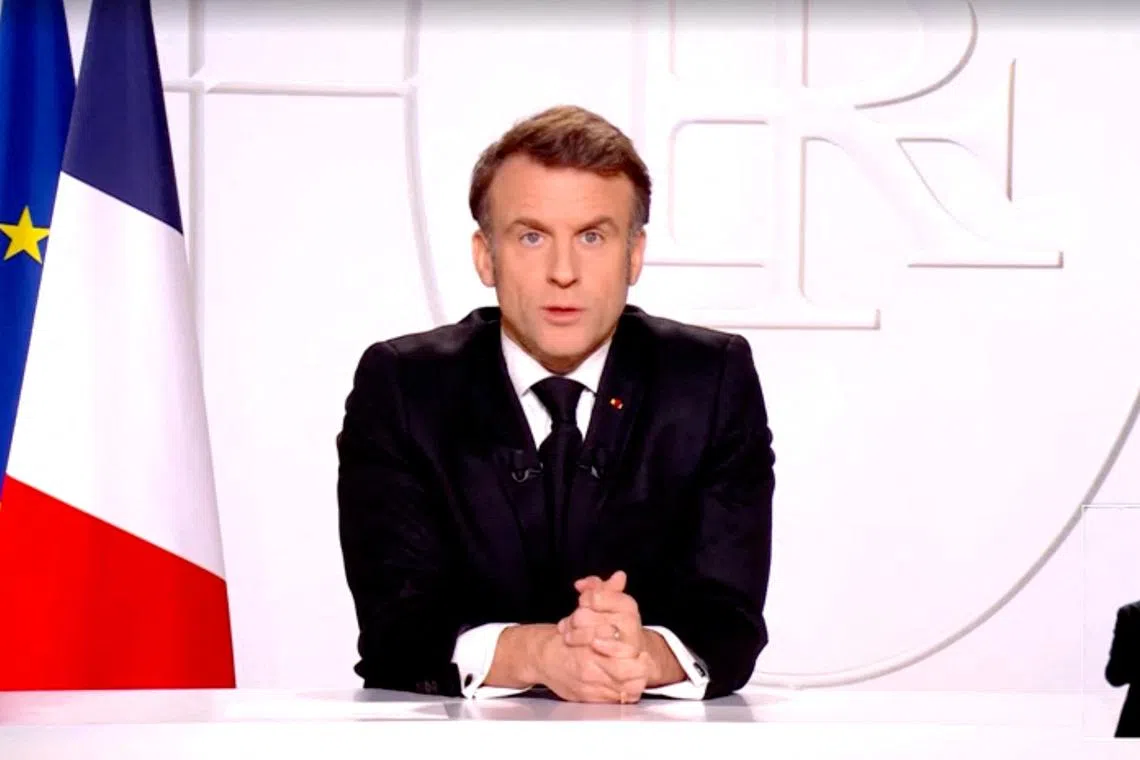EU leaders cautiously welcome Macron’s nuclear umbrella offer
Sign up now: Get ST's newsletters delivered to your inbox

French President Emmanuel Macron delivering his address on defence and security to the nation on March 5.
PHOTO: REUTERS
BRUSSELS - European leaders showed a cautiously receptive ear to President Emmanuel Macron's proposal to debate extending the French nuclear umbrella to Europe on March 6, though some were reluctant to draw a line under years of US protection.
In an address to the nation
Although both France and Britain are nuclear powers, most European countries' primary nuclear deterrence comes from the United States, a decades-old symbol of trans-Atlantic solidarity.
But the radical shift engineered by US President Donald Trump's new administration, which has made overtures to Russia, pressured Ukraine to make peace with Moscow, and adopted a more aggressive stance towards traditional allies, has focused minds.
"We Swedes, like most people, want to have as few nuclear weapons as possible, but right now we should be happy and grateful that there are two neighbouring countries that have nuclear weapons," Swedish Prime Minister Ulf Kristersson said.
"So I think it is good that France is showing openness," he told reporters, ahead of an EU summit in Brussels, though he said the issue was not on the meeting's agenda on March 6.
Denmark, once a staunch US ally now shocked by Mr Trump's thinly-veiled threats of taking over Greenland, a Danish territory, also appeared receptive.
"I think we have to discuss everything now, so all good ideas around the table have to be a part of our discussion," said Danish Prime Minister Mette Frederiksen.
Some Baltic countries, which have expressed fears they could be next if Russia was allowed to prevail in Ukraine, showed openness too.
"I think it's a very interesting idea," Lithuanian Prime Minister Gitanas Nauseda said. "A nuclear umbrella would serve as really very serious deterrence toward Russia," he said.
European caution, Russian fury
After Mr Macron first aired the idea of involving Europe in French strategic thinking around its nuclear deterrence in 2020, the response from his EU partners was muted.
But the clearest sign the mood had shifted after five weeks of Trump presidency came from Germany, with Mr Merz saying Berlin might need to become less reliant on the US nuclear umbrella.
He called for talks with France and Britain about an expansion of their nuclear protection, something Mr Macron referred to in his speech on March 5 as a "historical" turning point.
Inevitably for an issue where strategic ambiguity is essential, Mr Macron's proposal remains very vague, however, and some EU leaders expressed caution.
Experts say France could not hope to replicate the same level of strategic nuclear infrastructure the US has in Europe.
France has only a fraction of the number of airborne nuclear weapons the US can provide, and any upgrade of its systems would be costly and complicated.
Asked whether Latvia would accept French nuclear weapons on Latvian territory, Latvian Prime Minister Evika Silina said it was "too soon" to answer that.
Others also expressed caution. Czech Prime Minister Petr Fiala called the debate "premature".
"It is possible to consider it, but for now our security is guaranteed by close cooperation with the United States," Mr Fiala told a news conference in Prague before the EU summit.
Outgoing German Chancellor Olaf Scholz, who has displayed stark strategic differences with Mr Macron over the course of his mandate, said it was important not to give up on US military protection.
Mr Macron's comments caused furious reactions in Russia, with the foreign ministry saying Paris' "ambitions to become the nuclear 'patron' of all of Europe" would not lead to more security for France or its allies. REUTERS


